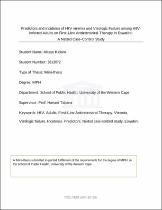| dc.contributor.advisor | Tabana, Hanani | |
| dc.contributor.author | Kidane, Altaye | |
| dc.date.accessioned | 2022-03-17T07:22:32Z | |
| dc.date.available | 2022-03-17T07:22:32Z | |
| dc.date.issued | 2021 | |
| dc.identifier.uri | http://hdl.handle.net/11394/8908 | |
| dc.description | Master of Public Health - MPH | en_US |
| dc.description.abstract | The global rapid scale up of access to antiretroviral treatment (ART) that has saved millions of lives of individuals infected with HIV through a durable and maximal viral suppression. However, achieving a 95% target of viral suppression to end the HIV epidemic demands close monitoring of clients on first line ART.
A nested case–control study design was used to investigate risk factors for viremia and virologic failure (VF) among HIV infected individuals (18 years and above) on first line ART for one or more years. All individuals initiated on first line ART from January 2015 to December 2019 were identified from the electronic medical records and clients with viremia and VF (cases) and without viremia (controls) were included in the study. The study protocol was reviewed and approved by the University of the Western Cape Biomedical Research Ethics Committee and Eswatini Health and Human Research Review Board. | en_US |
| dc.language.iso | en | en_US |
| dc.publisher | University of the Western Cape | en_US |
| dc.subject | HIV | en_US |
| dc.subject | Adults | en_US |
| dc.subject | First-Line Antiretroviral theraphy | en_US |
| dc.subject | Virologic failure | en_US |
| dc.subject | Eswatini | en_US |
| dc.title | Predictors and incidence of HIV viremia and virologic failure among HIV-infected adults on first-line antiretroviral therapy in Eswatini: A nested case–control study | en_US |
| dc.rights.holder | University of the Western Cape | en_US |

